Module 1 Wonders of the world Unit 2 The Grand Canyon was not just big.课件(70PPT 无素材)
文档属性
| 名称 | Module 1 Wonders of the world Unit 2 The Grand Canyon was not just big.课件(70PPT 无素材) |

|
|
| 格式 | zip | ||
| 文件大小 | 2.8MB | ||
| 资源类型 | 教案 | ||
| 版本资源 | 外研版 | ||
| 科目 | 英语 | ||
| 更新时间 | 2019-08-18 00:00:00 | ||
图片预览

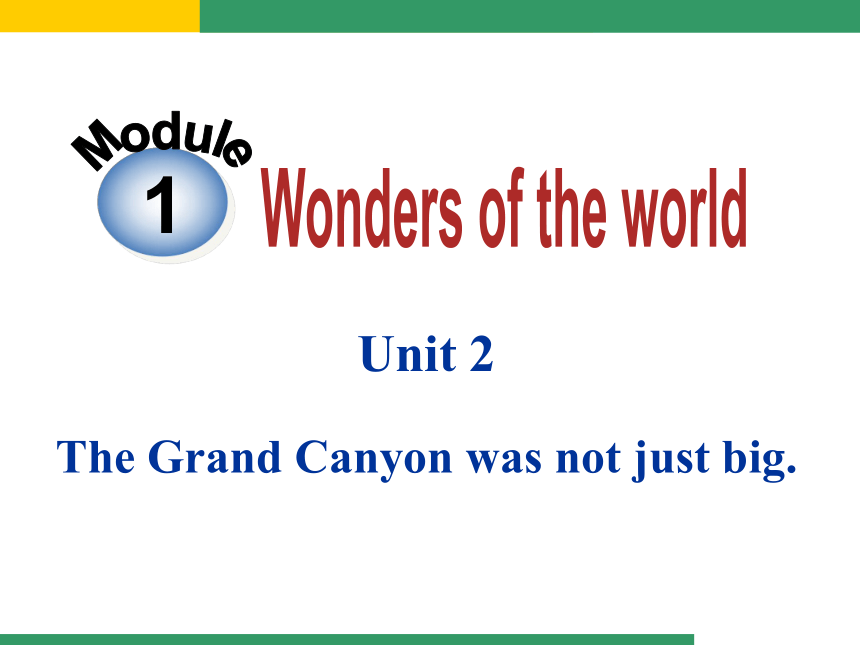
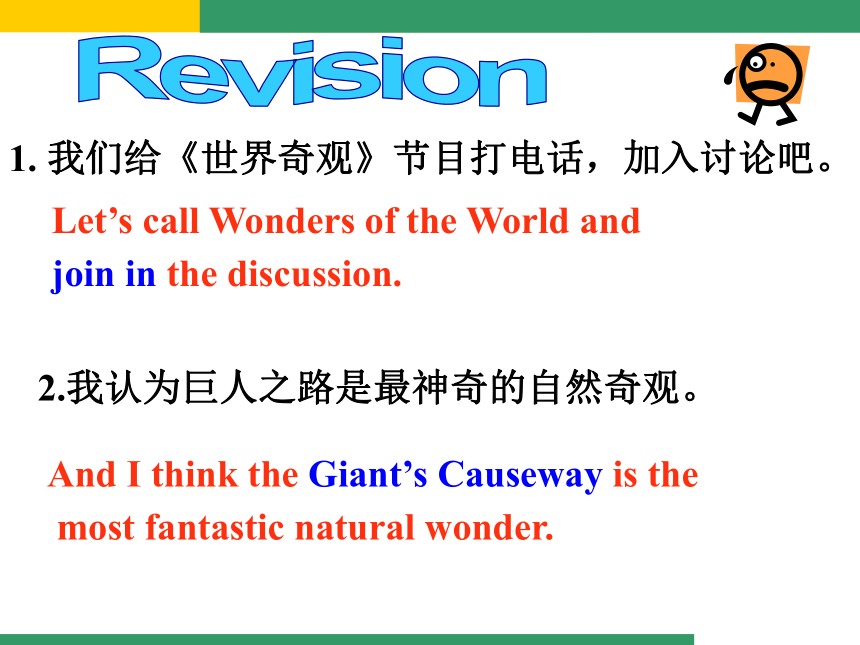
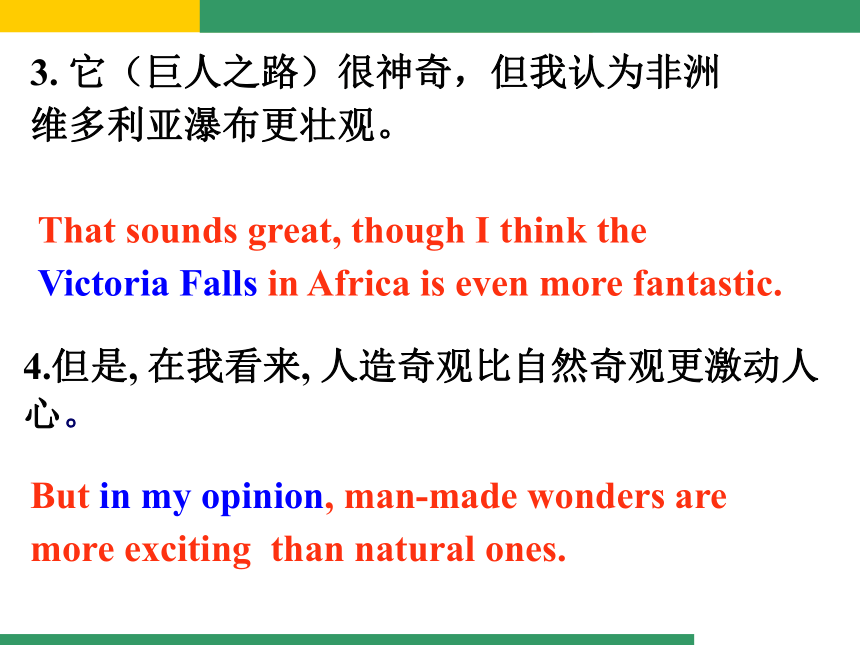
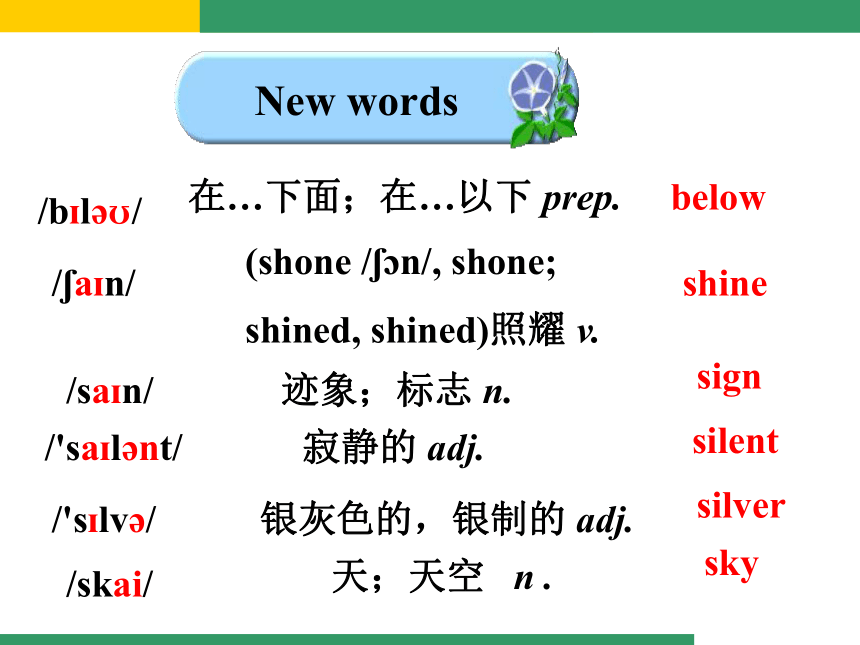
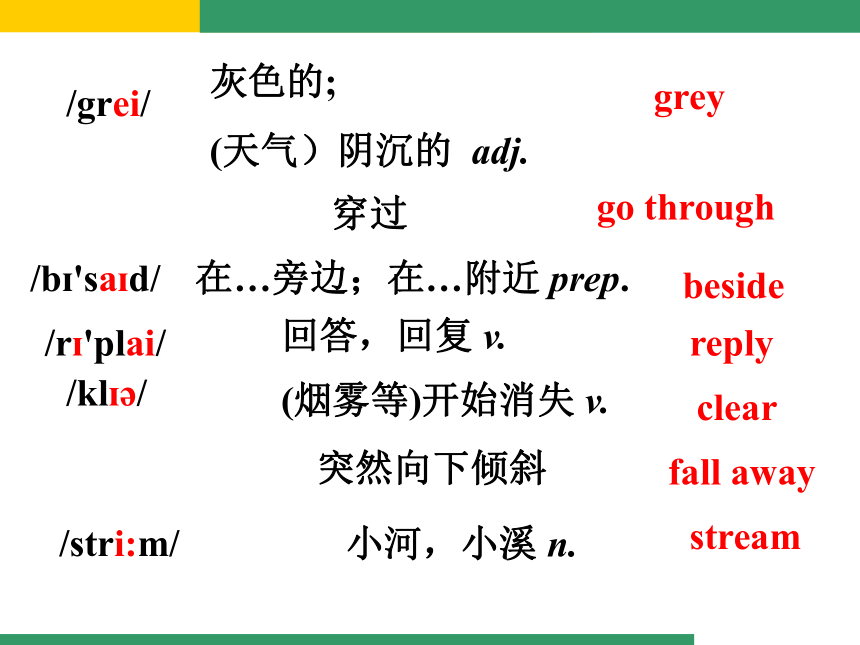
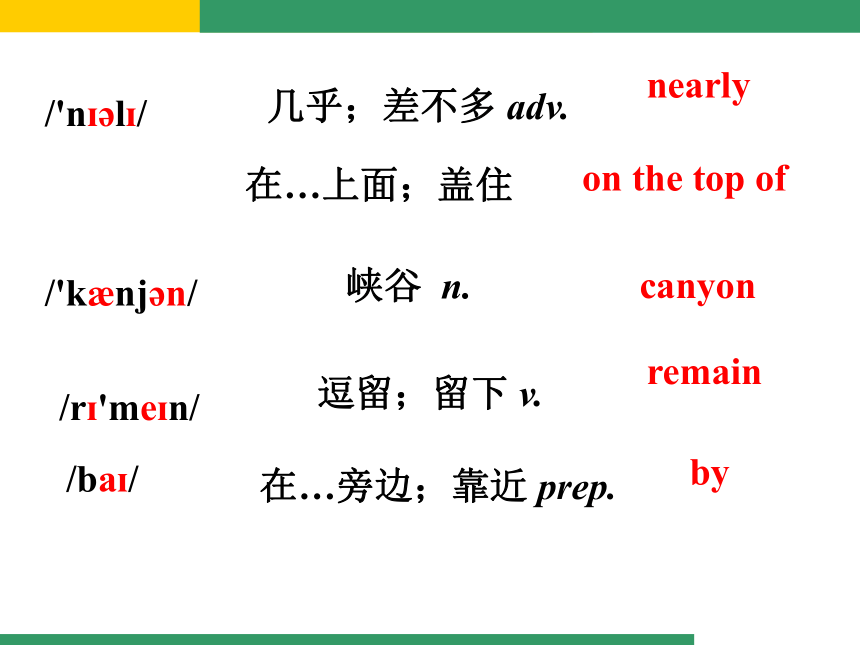
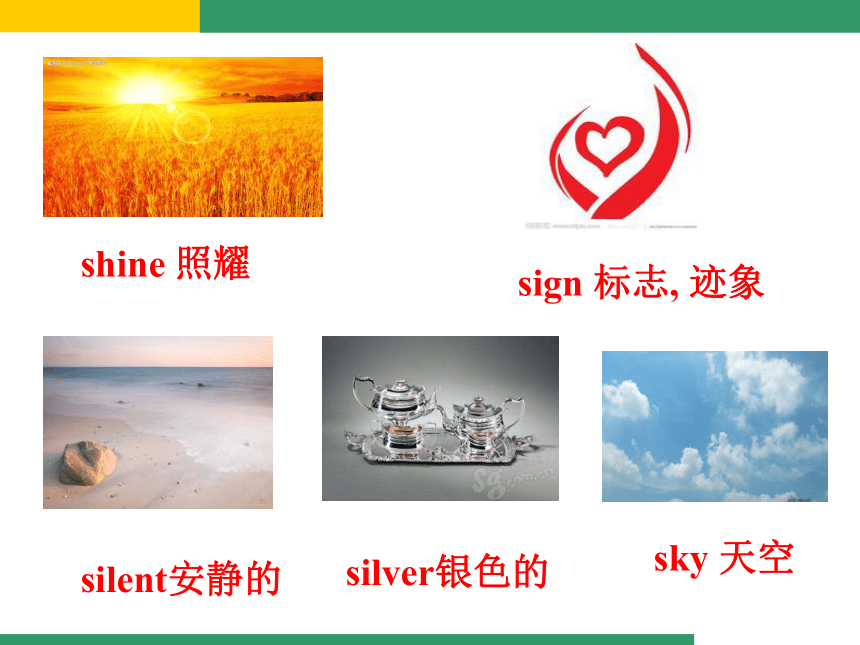
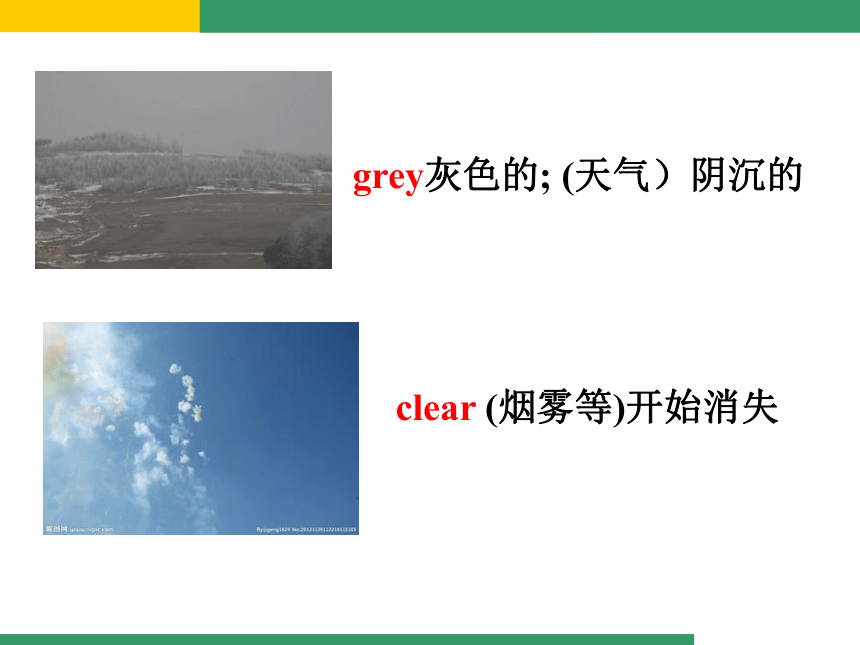
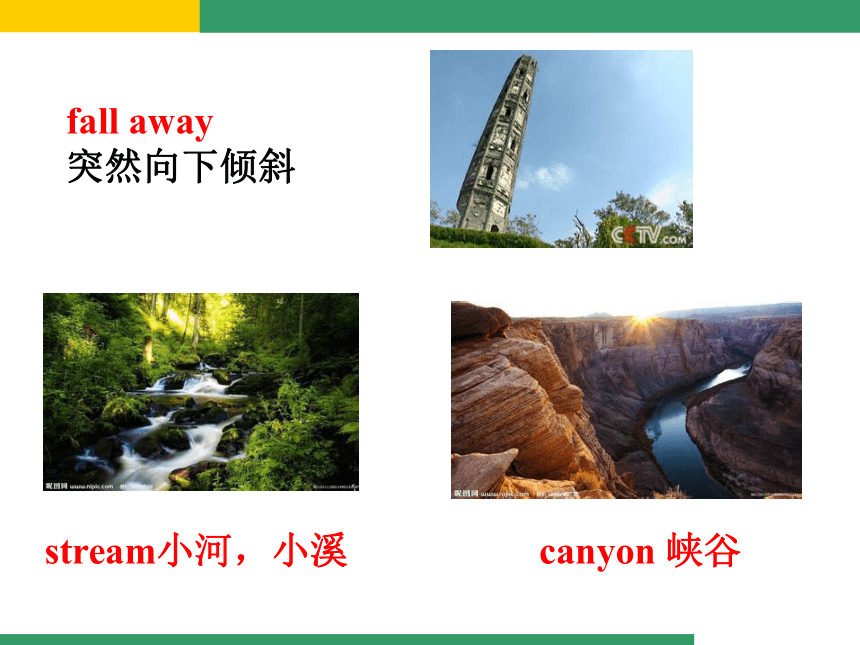
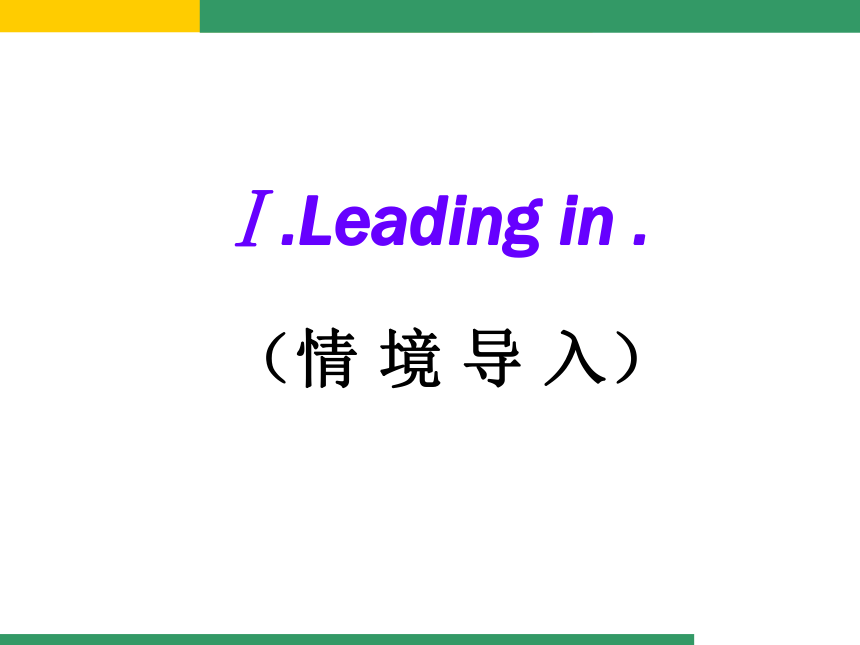
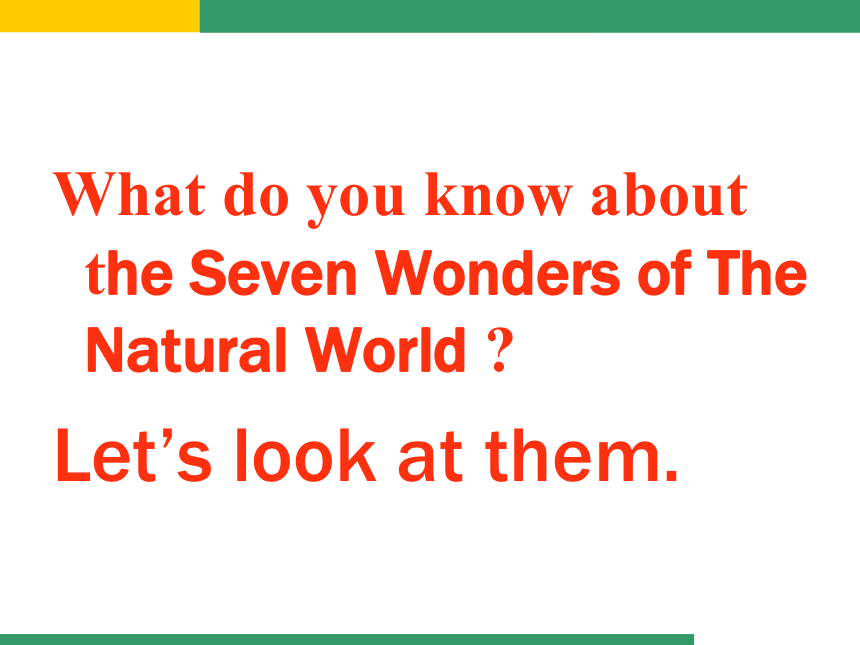
文档简介
课件70张PPT。九年级上册1Wonders of the world ModuleUnit 2
The Grand Canyon was not just big.1. 我们给《世界奇观》节目打电话,加入讨论吧。Let’s call Wonders of the World and
join in the discussion. 2.我认为巨人之路是最神奇的自然奇观。 And I think the Giant’s Causeway is the
most fantastic natural wonder.Revision4.但是, 在我看来, 人造奇观比自然奇观更激动人心。But in my opinion, man-made wonders are
more exciting than natural ones. 3. 它(巨人之路)很神奇,但我认为非洲
维多利亚瀑布更壮观。That sounds great, though I think the
Victoria Falls in Africa is even more fantastic. New wordsskysignshine below 天;天空 n ./skai//sa?n/迹象;标志 n.(shone /??n/, shone;
shined, shined)照耀 v./?a?n//b?l??/在…下面;在…以下 prep.silver银灰色的,银制的 adj./'s?lv?/ silent 寂静的 adj. /'sa?l?nt/go throughstream穿过小河,小溪 n. /stri:m/fall away突然向下倾斜beside在…旁边;在…附近 prep./b?'sa?d/ reply回答,回复 v./r?'plai/ clear(烟雾等)开始消失 v./kl??/grey灰色的;
(天气)阴沉的 adj./grei/canyon峡谷 n./'k?nj?n/逗留;留下 v.remain/r?'me?n/nearly几乎;差不多 adv./'n??l?/on the top of 在…上面;盖住by在…旁边;靠近 prep./ba?/ shine 照耀sign 标志, 迹象silent安静的silver银色的sky 天空grey灰色的; (天气)阴沉的 clear (烟雾等)开始消失 fall away
突然向下倾斜stream小河,小溪canyon 峡谷Ⅰ.Leading in . (情 境 导 入)What do you know about the Seven Wonders of The Natural World ?
Let’s look at them.南非赞比西河,
维多利亚瀑布 Victoria?Falls, Zambezi??Alaska Glacier Gulf
National Park 美国阿拉斯加
冰河湾国家公园 Everest/Qomolangma Mount中国珠穆朗玛峰Mammoth Cave
National Park 美国肯塔基州
猛玛洞穴国家公园 Russian
Baikal Lake 俄罗斯贝加尔湖 美国黄石公园 American
Yellowstone
National Park 美国科罗拉多大峡谷Colorado, the Grand Canyon 大峡谷位于美国科罗拉多高原上,科罗拉多河从中流过。据说在十六世纪,有一个叫科罗拉多的人为了寻找传说中的七座黄金城,从遥远的地方跋涉到此地,发现了大峡谷,科罗拉多大峡谷由此得名。据地理学家考证,大峡谷已走过六百万年的历史,是大自然在地球上的杰作,辉煌与壮丽远非一般自然景色可比。美国人以此为骄傲与自豪。 Reading and vocabularyWork in pairs. Talk about a great natural
wonder you know. Use the words in the box to help you.below, deep, fantastic, high, long,
natural, shine, sign, silent, silverThe Grand Canyon 科罗拉多大峡谷Ⅱ.Reading comprehension (阅 读 理 解) 2. Read the passage and complete the table.
Read the first paragraph and answer:
Q: What did the writer do after he arrived?He looked to the east ,got out of the car, went through a gate ,walked along a path.A great wonder of the natural world When I arrived, it was early morning and it was raining. I looked to the east – the sky was becoming grey. I got out of the car, went through a gate and walked along a dark path. There was nothing to see, but I knew it was there.
Read the second paragraph and answer:
Q: Why was there nothing to see?
A: Because there was nothing.
B: Because it was too dark.
C: Because it was in the morning. After about a mile, a stranger appeared beside the path. “Am I going the right way?” I asked. He knew where I was going. “Yes,” he
replied, “you’ll get there in five minutes.”
Finally, I came to some rocks and stopped. I
looked over them, but it was silent and there
was no sign of it.Read the third paragraph and answer:
Q: Where was the writer facing on the edge of the Grand Canyon?
A: To the south
B: To the north
C: To the east
D: To the west Suddenly, the rain stopped and the clouds
cleared. The sun rose behind me and shone on
the rocks. Far below me, the ground fell away
and down to a river. I was looking across one
of the wonders of the natural world - the
Grand Canyon.Read the fourth paragraph and answer:The Grand CanyonHow deepHow wideHow longAbout 15 miles away,maybe
more on both sides the canyon went
far away for more than 200
milesIf you put the two buildings in the world on top of each other at the bottom of the canyon,they still would not reach the top I looked down to the Colorado River, a silver stream nearly one mile below me. If you put the two tallest buildings in the world on top of each other at the bottom of the canyon, they still would not reach the top. Then I looked across to the other side of the canyon. It was about fifteen miles away, maybe more. Finally, I looked to my left and to my right, and on both sides the canyon went far away for more than 200 miles. The Grand Canyon was not just big. It was huge! I remained by the canyon for about half an hour, and I asked myself, “Is the Grand Canyon the greatest wonder of the natural world?” I certainly know the answer. What do you think?Retell the passageIt was _____ _____ and it was ______. In the east, the sky was _______ ____, but there was _______ __ ____ beside the path. After about a kilometer when I ____ ____ the path, the clouds ______ and the rain ______. I saw that the ground ___ ____ and ____ __ a river. First, I _____ _____ to the Colorado River, it was about ____ ________below me. Then I ______ _____ to the other side of the Canyon, it was about ____ miles away. Finally, I ____ ____ my left and my right, it ws over ____ miles _____. I think the Grand Canyon is ___ ____ the wonders of the natural world and the _____ wonder in the _____ world.early morningrainingbecoming greynothing to seewalked clearedstoppedfell awayalongdown tolooked one looked across15looked to200mileslongone ofgreatestnaturaldown1. Where does the passage probably come from?
a) A magzine. b) A grammar book.
c) A dictionary. d) A storybook.
2. Why was there nothing to see?
a) Because there was nothing.
b) Because it was too dark.
c) Because it was raining.
d) Because it was in the morning.3. Choose the correct answer.3. Which direction was the writer facing while he
/she was looking over the Grand Canyon?
a) South. b) North. c) East. d) West.
4. What is the writer’s purpose in writing this
passage?
a) To give facts about the natural world.
b) To say how he feels about the natural world.
c) To tell an interesting story about the Grand
Canyon.
d) To attract people to visit the Grand Canyon.4. Complete the passage with the words in the
box.below, mile, remain, reply, sign, silent, sky, stream, through In the dark, there is no (1)_______of the Grand Canyon, and it is (2)_______ .
But if you (3)_______ by the Grand Canyon as the (4)_________ gets brighter and look down about one (5)______ , you can see the Colorado River (6)___________you. signsilentremainskymilebelow It looks like a silver (7)________ as it passes (8)_________the rocks at the bottom of the canyon. If someone asks you whether the Grand Canyon is the greatest wonder of the natural world, it may be easy to (9)_________ .
streamthroughreplyⅢ.
Consolidation(梳理巩固)Language points1. I got out of the car, went through a gate
and walked along a path.
★ get out of … 从……内出来; 逃避; 摆脱
We only want to get out of this dark room
as soon as possible.
我们只想尽快离开这个暗室。
get in 进入 get to 到达
get on 上(车等) get off 下(车等)2. After about a kilometre, a stranger appeared in front of me.
appear vi. 出现
A rainbow appeared after the rain.
雨后空中出现了一道彩虹。
disappear vi. 消失
The sun disappeared behind the cloud.
太阳在云层后面消失了。3. “Yes,” he replied, “you’ll get there in five minutes.
reply v.回答
reply to sb/sth 回答某人/某事
1). Who can reply to my question?
谁能回答我的问题?
2). Why don’t you reply to me?
你为什么不回答我呀?
★ reply + that从句 回答到……
I replied that I was unable to help them.
我回答说我帮不到他们的忙。辨析:reply 与 answer(1). 两者均表示“回答”,一般情况下可以换用。
answer 用作及物动词和不及物动词均可。reply除后接that从句或引出直接引语是及物动词外,一般只用作不及物动词,其后若接名词或代词作宾语,应借助介词to。
He didn’t reply to / answer my question.
他没有回答我的问题。
He replied that he had changed his mind.他回答说他改变了主思。比较下面两句:
He did not know what to reply.他不知道回答什么。(即:用什么回答)
He did not know what to reply to.他不知道回答什么冋题。(即:对什么作回答)2). answer除表示“回答”外,还可表示接听(电话)或对门铃等声响作出反应等(常 与 telephone,door, bell, doorbell 等连用),但 reply 不能这样用。
Who answered the telephone?谁接的电话?3). 两者除用作动词外,都可用作名词。表示“对……的回答(答复、答案)”等,其后均接介词to (不用of)。
Have you had an answer to your letter?
你寄出的信有回音了吗?
I received no reply to my question.
我的要求没有收到任何的回复4. I looked carefully over them, but it was silent and there was no sign of it.
★ look over 从……上面看过去
She looked over the top of the mountain, and
saw rocks in different shapes.
从山顶上看过去,她看见了形状各异的岩石。
拓展:look over 检查
Can you look over my composition for me?
你能帮我检查一下我的作文吗?
I looked down to the Colorado River...
我俯瞰科罗拉多河……Finally, I looked to my left and to my right...
最后,我向左右遥望……★ look over 从……上面看过去
She looked over the top of the mountain, and saw rocks in different shapes.
从山顶上看过去,她看见了形状各异的岩石。
补充:look over 检查5. I looked down to the Colorado River about 2,000 metres below me.
★ look down 从……往下看;俯视6. Then I looked across to other side of the
canyon.
★ look across 向对面看
He often looks across to the mountains in class.
他上课经常看对面的山。
side n. 边,面,侧
on the left/right of …/on one’s left/right7. Finally, I looked to my left and to my right, and on both sides the canyon went far away for more than 200 miles.
★ look to … 向…… (某个方向)看
Look to the left and to the right before crossing the street. 过马路要左右看。look 短语小聚look up 向上看;查阅(字典等)
look to one’s left/right 向……左右看
look down 向下看;瞧不起
look across 向……对面看
look for 寻找
look after 照顾
look over 从……上方看过去8. Suddenly, the rain stopped and the clouds cleared.
clear v. ① (云或雾) 散开 ② 打扫干净
1). The fog cleared and we saw the whole tower in the end.
雾散了,我们终于看见整个塔了。2). I have to clear the snow in front of the door
before I go out.
我出门前得把门前的雪打扫干净。
clear adj. 清晰的
We should keep clear minds.
我们必须保持清晰的头脑。9.The sun rose behind me and shone on the rocks.
(1). rise v. 升起 rise – rose – risen
Everyone knows that the sun rises from the east. 人人都知道太阳从东边升起。The river rose two metres after the rain.
雨后河水涨了两米。(2). 辨析: lift, raise与rise.1). lift指用体力或机械力把某物从地面举到
一 定的高度
The box is too heavy for me to lift.
这个箱子太重了,我举不起来。2). raise及物动词,当表示“举起”时,可以 和lift互换使用,还可以表示提高职位,工资等。过去式和过去分词都是raised,现在分词raising.
He was raised to an important position.
他被提拔到一个重要的职位。3). rise是不及物动词,侧重表示由低到高的变化过程,也可指物价“上涨”。过去式,过去分词分别是rose和risen,现在分词是rising.
Prices continue to rise.物价继续上涨。
The yield of rice will rise to 700 kilograms per mu.
水稻的产量将上升到每亩700公斤。n. 地面下降;减少prep. 在……的下面10. Far below me, the ground fell away and down
to a river.11. 他站在峡谷的边缘上不敢往下看。
If you put the two tallest buildings in the world on top of each other at the bottom of the canyon, they still would not reach the top.★ at the bottom of … 在……的底部
The village lies at the bottom of the valley.
这山村坐落在山谷底.Some adjectives tell you facts, such
as wide, deep, high and tall; some
adjectives tell you the opinion of
the author, like wonderful, huge
and great. Learn to use them to talk
about facts and give your opinion. Learning to learn5. Complete the table with facts about a natural or man-made wonder of the world.Writing6. Imagine you have just visited one of the natural or man-made wonders. Write sentences and describe how you felt when you visited the wonder.Say when you visited it.I just visited the Great Wall last month.Say where it is.It is in the north of China..Describe its size.It is surpass10,000 miles.※※※Say what interesting facts you know.
Say what happened when you visited it.
Say how you felt.It is famous for its unique architectural style,
a long history and surpass 10,000 miles. It was raining when we were walking up
the Great Wall, but we didn’t stop. Finally,
we reached the top of it.I felt very excited, ?. The Great Wall is so
majestic, of great momentum .长城雄伟壮观,气势磅礴※※※Now write a passage. Use the sentences you have written to help you. The Great Wall is one of the great wonders
of the world. It was built in the Qin Dynasty
and it has a history of more than 2,000 years.
It lies in the north of China. The wall is about 6,700 kilometers long and stretches from Shanhaiguan to Jiayuguan. The height of the wall is 7.8 meters, and its width averages out at around 6.5 meters at the base and 5.8 meters at the top. The Great Wall has become a symbol of the Chinese nation and its culture.
Ⅳ. Extension(拓展提高)一. 翻译词组
从…出来____________________
在…边缘___________________
3. 在…底部_________________
4. 消失在远方_________________________
5.朝另一端看…___________ Exercisesget out ofat the edge ofat the bottom ofdisappear in the distancelook across 二. 完成句子
1.别把杯子放在桌边,可能会掉下来。
Don’t put the glass________________ the table , it might fall down .
2.不久,他们就消失在远处。
Soon they __________________the distance.
3.他父亲要两天后回来。
His father will come __________________.
4.她刚才从超市出来。
She __________________the supermarket.at the edge ofdisappeared inback two days laterjust came out from 三. 选择填空。
( )1. It rained heavily yesterday. The Yellow River _____ about two metres.
A. has left B. has raised C. has risen D. rise
( ) 2. She got out of the car and went _____ a big gate.
A. over B. cross C. across D. through
( ) 3. Don’t put the glass ___ the table, it may get knocked off.
in the centre of B. at the edge of
C. on the edge of D. on the rightDDB( ) 4. --- _____ is your home from here?
--- It’s three kilometers.
A. How soon B. How many
C. How far D. How long
( ) 5.What a sunny day! The sky is ____ without any clouds.
A. natural B. clear C. clean D. lightCB(总 结 归 纳)说一说:这节课你有哪些收获?Ⅴ. Summarize.大清早 early morning
从车上出来 get out of the car
穿过门 go through a gate
沿着小路走 walk along the path
什么也没看到 There is nothing to see.
云散开了 the clouds cleared.
太阳升起 the sun rose rises.
跌下去 fall away and down
眺望 look across
在底部 at the bottom of俯视 look down
一条银色的河流 a silver stream
够到顶部 reach the top
峡谷的另外一边 the other side of
the canyon
向左看 look to the left
延伸得 go far away
多深 how deep
多宽 how wide
多长 how longAre you the best partner?最佳师友Homework 1. Remember all the new words and expressions we’ve learned today.
2. Finish exercises.1. To search some information about the Stonehenge.
2.To preview Unit 3PreviewThank you very much!
The Grand Canyon was not just big.1. 我们给《世界奇观》节目打电话,加入讨论吧。Let’s call Wonders of the World and
join in the discussion. 2.我认为巨人之路是最神奇的自然奇观。 And I think the Giant’s Causeway is the
most fantastic natural wonder.Revision4.但是, 在我看来, 人造奇观比自然奇观更激动人心。But in my opinion, man-made wonders are
more exciting than natural ones. 3. 它(巨人之路)很神奇,但我认为非洲
维多利亚瀑布更壮观。That sounds great, though I think the
Victoria Falls in Africa is even more fantastic. New wordsskysignshine below 天;天空 n ./skai//sa?n/迹象;标志 n.(shone /??n/, shone;
shined, shined)照耀 v./?a?n//b?l??/在…下面;在…以下 prep.silver银灰色的,银制的 adj./'s?lv?/ silent 寂静的 adj. /'sa?l?nt/go throughstream穿过小河,小溪 n. /stri:m/fall away突然向下倾斜beside在…旁边;在…附近 prep./b?'sa?d/ reply回答,回复 v./r?'plai/ clear(烟雾等)开始消失 v./kl??/grey灰色的;
(天气)阴沉的 adj./grei/canyon峡谷 n./'k?nj?n/逗留;留下 v.remain/r?'me?n/nearly几乎;差不多 adv./'n??l?/on the top of 在…上面;盖住by在…旁边;靠近 prep./ba?/ shine 照耀sign 标志, 迹象silent安静的silver银色的sky 天空grey灰色的; (天气)阴沉的 clear (烟雾等)开始消失 fall away
突然向下倾斜stream小河,小溪canyon 峡谷Ⅰ.Leading in . (情 境 导 入)What do you know about the Seven Wonders of The Natural World ?
Let’s look at them.南非赞比西河,
维多利亚瀑布 Victoria?Falls, Zambezi??Alaska Glacier Gulf
National Park 美国阿拉斯加
冰河湾国家公园 Everest/Qomolangma Mount中国珠穆朗玛峰Mammoth Cave
National Park 美国肯塔基州
猛玛洞穴国家公园 Russian
Baikal Lake 俄罗斯贝加尔湖 美国黄石公园 American
Yellowstone
National Park 美国科罗拉多大峡谷Colorado, the Grand Canyon 大峡谷位于美国科罗拉多高原上,科罗拉多河从中流过。据说在十六世纪,有一个叫科罗拉多的人为了寻找传说中的七座黄金城,从遥远的地方跋涉到此地,发现了大峡谷,科罗拉多大峡谷由此得名。据地理学家考证,大峡谷已走过六百万年的历史,是大自然在地球上的杰作,辉煌与壮丽远非一般自然景色可比。美国人以此为骄傲与自豪。 Reading and vocabularyWork in pairs. Talk about a great natural
wonder you know. Use the words in the box to help you.below, deep, fantastic, high, long,
natural, shine, sign, silent, silverThe Grand Canyon 科罗拉多大峡谷Ⅱ.Reading comprehension (阅 读 理 解) 2. Read the passage and complete the table.
Read the first paragraph and answer:
Q: What did the writer do after he arrived?He looked to the east ,got out of the car, went through a gate ,walked along a path.A great wonder of the natural world When I arrived, it was early morning and it was raining. I looked to the east – the sky was becoming grey. I got out of the car, went through a gate and walked along a dark path. There was nothing to see, but I knew it was there.
Read the second paragraph and answer:
Q: Why was there nothing to see?
A: Because there was nothing.
B: Because it was too dark.
C: Because it was in the morning. After about a mile, a stranger appeared beside the path. “Am I going the right way?” I asked. He knew where I was going. “Yes,” he
replied, “you’ll get there in five minutes.”
Finally, I came to some rocks and stopped. I
looked over them, but it was silent and there
was no sign of it.Read the third paragraph and answer:
Q: Where was the writer facing on the edge of the Grand Canyon?
A: To the south
B: To the north
C: To the east
D: To the west Suddenly, the rain stopped and the clouds
cleared. The sun rose behind me and shone on
the rocks. Far below me, the ground fell away
and down to a river. I was looking across one
of the wonders of the natural world - the
Grand Canyon.Read the fourth paragraph and answer:The Grand CanyonHow deepHow wideHow longAbout 15 miles away,maybe
more on both sides the canyon went
far away for more than 200
milesIf you put the two buildings in the world on top of each other at the bottom of the canyon,they still would not reach the top I looked down to the Colorado River, a silver stream nearly one mile below me. If you put the two tallest buildings in the world on top of each other at the bottom of the canyon, they still would not reach the top. Then I looked across to the other side of the canyon. It was about fifteen miles away, maybe more. Finally, I looked to my left and to my right, and on both sides the canyon went far away for more than 200 miles. The Grand Canyon was not just big. It was huge! I remained by the canyon for about half an hour, and I asked myself, “Is the Grand Canyon the greatest wonder of the natural world?” I certainly know the answer. What do you think?Retell the passageIt was _____ _____ and it was ______. In the east, the sky was _______ ____, but there was _______ __ ____ beside the path. After about a kilometer when I ____ ____ the path, the clouds ______ and the rain ______. I saw that the ground ___ ____ and ____ __ a river. First, I _____ _____ to the Colorado River, it was about ____ ________below me. Then I ______ _____ to the other side of the Canyon, it was about ____ miles away. Finally, I ____ ____ my left and my right, it ws over ____ miles _____. I think the Grand Canyon is ___ ____ the wonders of the natural world and the _____ wonder in the _____ world.early morningrainingbecoming greynothing to seewalked clearedstoppedfell awayalongdown tolooked one looked across15looked to200mileslongone ofgreatestnaturaldown1. Where does the passage probably come from?
a) A magzine. b) A grammar book.
c) A dictionary. d) A storybook.
2. Why was there nothing to see?
a) Because there was nothing.
b) Because it was too dark.
c) Because it was raining.
d) Because it was in the morning.3. Choose the correct answer.3. Which direction was the writer facing while he
/she was looking over the Grand Canyon?
a) South. b) North. c) East. d) West.
4. What is the writer’s purpose in writing this
passage?
a) To give facts about the natural world.
b) To say how he feels about the natural world.
c) To tell an interesting story about the Grand
Canyon.
d) To attract people to visit the Grand Canyon.4. Complete the passage with the words in the
box.below, mile, remain, reply, sign, silent, sky, stream, through In the dark, there is no (1)_______of the Grand Canyon, and it is (2)_______ .
But if you (3)_______ by the Grand Canyon as the (4)_________ gets brighter and look down about one (5)______ , you can see the Colorado River (6)___________you. signsilentremainskymilebelow It looks like a silver (7)________ as it passes (8)_________the rocks at the bottom of the canyon. If someone asks you whether the Grand Canyon is the greatest wonder of the natural world, it may be easy to (9)_________ .
streamthroughreplyⅢ.
Consolidation(梳理巩固)Language points1. I got out of the car, went through a gate
and walked along a path.
★ get out of … 从……内出来; 逃避; 摆脱
We only want to get out of this dark room
as soon as possible.
我们只想尽快离开这个暗室。
get in 进入 get to 到达
get on 上(车等) get off 下(车等)2. After about a kilometre, a stranger appeared in front of me.
appear vi. 出现
A rainbow appeared after the rain.
雨后空中出现了一道彩虹。
disappear vi. 消失
The sun disappeared behind the cloud.
太阳在云层后面消失了。3. “Yes,” he replied, “you’ll get there in five minutes.
reply v.回答
reply to sb/sth 回答某人/某事
1). Who can reply to my question?
谁能回答我的问题?
2). Why don’t you reply to me?
你为什么不回答我呀?
★ reply + that从句 回答到……
I replied that I was unable to help them.
我回答说我帮不到他们的忙。辨析:reply 与 answer(1). 两者均表示“回答”,一般情况下可以换用。
answer 用作及物动词和不及物动词均可。reply除后接that从句或引出直接引语是及物动词外,一般只用作不及物动词,其后若接名词或代词作宾语,应借助介词to。
He didn’t reply to / answer my question.
他没有回答我的问题。
He replied that he had changed his mind.他回答说他改变了主思。比较下面两句:
He did not know what to reply.他不知道回答什么。(即:用什么回答)
He did not know what to reply to.他不知道回答什么冋题。(即:对什么作回答)2). answer除表示“回答”外,还可表示接听(电话)或对门铃等声响作出反应等(常 与 telephone,door, bell, doorbell 等连用),但 reply 不能这样用。
Who answered the telephone?谁接的电话?3). 两者除用作动词外,都可用作名词。表示“对……的回答(答复、答案)”等,其后均接介词to (不用of)。
Have you had an answer to your letter?
你寄出的信有回音了吗?
I received no reply to my question.
我的要求没有收到任何的回复4. I looked carefully over them, but it was silent and there was no sign of it.
★ look over 从……上面看过去
She looked over the top of the mountain, and
saw rocks in different shapes.
从山顶上看过去,她看见了形状各异的岩石。
拓展:look over 检查
Can you look over my composition for me?
你能帮我检查一下我的作文吗?
I looked down to the Colorado River...
我俯瞰科罗拉多河……Finally, I looked to my left and to my right...
最后,我向左右遥望……★ look over 从……上面看过去
She looked over the top of the mountain, and saw rocks in different shapes.
从山顶上看过去,她看见了形状各异的岩石。
补充:look over 检查5. I looked down to the Colorado River about 2,000 metres below me.
★ look down 从……往下看;俯视6. Then I looked across to other side of the
canyon.
★ look across 向对面看
He often looks across to the mountains in class.
他上课经常看对面的山。
side n. 边,面,侧
on the left/right of …/on one’s left/right7. Finally, I looked to my left and to my right, and on both sides the canyon went far away for more than 200 miles.
★ look to … 向…… (某个方向)看
Look to the left and to the right before crossing the street. 过马路要左右看。look 短语小聚look up 向上看;查阅(字典等)
look to one’s left/right 向……左右看
look down 向下看;瞧不起
look across 向……对面看
look for 寻找
look after 照顾
look over 从……上方看过去8. Suddenly, the rain stopped and the clouds cleared.
clear v. ① (云或雾) 散开 ② 打扫干净
1). The fog cleared and we saw the whole tower in the end.
雾散了,我们终于看见整个塔了。2). I have to clear the snow in front of the door
before I go out.
我出门前得把门前的雪打扫干净。
clear adj. 清晰的
We should keep clear minds.
我们必须保持清晰的头脑。9.The sun rose behind me and shone on the rocks.
(1). rise v. 升起 rise – rose – risen
Everyone knows that the sun rises from the east. 人人都知道太阳从东边升起。The river rose two metres after the rain.
雨后河水涨了两米。(2). 辨析: lift, raise与rise.1). lift指用体力或机械力把某物从地面举到
一 定的高度
The box is too heavy for me to lift.
这个箱子太重了,我举不起来。2). raise及物动词,当表示“举起”时,可以 和lift互换使用,还可以表示提高职位,工资等。过去式和过去分词都是raised,现在分词raising.
He was raised to an important position.
他被提拔到一个重要的职位。3). rise是不及物动词,侧重表示由低到高的变化过程,也可指物价“上涨”。过去式,过去分词分别是rose和risen,现在分词是rising.
Prices continue to rise.物价继续上涨。
The yield of rice will rise to 700 kilograms per mu.
水稻的产量将上升到每亩700公斤。n. 地面下降;减少prep. 在……的下面10. Far below me, the ground fell away and down
to a river.11. 他站在峡谷的边缘上不敢往下看。
If you put the two tallest buildings in the world on top of each other at the bottom of the canyon, they still would not reach the top.★ at the bottom of … 在……的底部
The village lies at the bottom of the valley.
这山村坐落在山谷底.Some adjectives tell you facts, such
as wide, deep, high and tall; some
adjectives tell you the opinion of
the author, like wonderful, huge
and great. Learn to use them to talk
about facts and give your opinion. Learning to learn5. Complete the table with facts about a natural or man-made wonder of the world.Writing6. Imagine you have just visited one of the natural or man-made wonders. Write sentences and describe how you felt when you visited the wonder.Say when you visited it.I just visited the Great Wall last month.Say where it is.It is in the north of China..Describe its size.It is surpass10,000 miles.※※※Say what interesting facts you know.
Say what happened when you visited it.
Say how you felt.It is famous for its unique architectural style,
a long history and surpass 10,000 miles. It was raining when we were walking up
the Great Wall, but we didn’t stop. Finally,
we reached the top of it.I felt very excited, ?. The Great Wall is so
majestic, of great momentum .长城雄伟壮观,气势磅礴※※※Now write a passage. Use the sentences you have written to help you. The Great Wall is one of the great wonders
of the world. It was built in the Qin Dynasty
and it has a history of more than 2,000 years.
It lies in the north of China. The wall is about 6,700 kilometers long and stretches from Shanhaiguan to Jiayuguan. The height of the wall is 7.8 meters, and its width averages out at around 6.5 meters at the base and 5.8 meters at the top. The Great Wall has become a symbol of the Chinese nation and its culture.
Ⅳ. Extension(拓展提高)一. 翻译词组
从…出来____________________
在…边缘___________________
3. 在…底部_________________
4. 消失在远方_________________________
5.朝另一端看…___________ Exercisesget out ofat the edge ofat the bottom ofdisappear in the distancelook across 二. 完成句子
1.别把杯子放在桌边,可能会掉下来。
Don’t put the glass________________ the table , it might fall down .
2.不久,他们就消失在远处。
Soon they __________________the distance.
3.他父亲要两天后回来。
His father will come __________________.
4.她刚才从超市出来。
She __________________the supermarket.at the edge ofdisappeared inback two days laterjust came out from 三. 选择填空。
( )1. It rained heavily yesterday. The Yellow River _____ about two metres.
A. has left B. has raised C. has risen D. rise
( ) 2. She got out of the car and went _____ a big gate.
A. over B. cross C. across D. through
( ) 3. Don’t put the glass ___ the table, it may get knocked off.
in the centre of B. at the edge of
C. on the edge of D. on the rightDDB( ) 4. --- _____ is your home from here?
--- It’s three kilometers.
A. How soon B. How many
C. How far D. How long
( ) 5.What a sunny day! The sky is ____ without any clouds.
A. natural B. clear C. clean D. lightCB(总 结 归 纳)说一说:这节课你有哪些收获?Ⅴ. Summarize.大清早 early morning
从车上出来 get out of the car
穿过门 go through a gate
沿着小路走 walk along the path
什么也没看到 There is nothing to see.
云散开了 the clouds cleared.
太阳升起 the sun rose rises.
跌下去 fall away and down
眺望 look across
在底部 at the bottom of俯视 look down
一条银色的河流 a silver stream
够到顶部 reach the top
峡谷的另外一边 the other side of
the canyon
向左看 look to the left
延伸得 go far away
多深 how deep
多宽 how wide
多长 how longAre you the best partner?最佳师友Homework 1. Remember all the new words and expressions we’ve learned today.
2. Finish exercises.1. To search some information about the Stonehenge.
2.To preview Unit 3PreviewThank you very much!
同课章节目录
- Module 1 Wonders of the world
- Unit 1 It's more than 2,000 years old.
- Unit 2 The Grand Canyon was not just big.
- Unit 3 Language in use
- Module 2 Public holidays
- Unit 1 My family always go somewhere interesting a
- Unit 2 We have celebrated the festival since the f
- Unit 3 Language in use
- Module 3 Heroes
- Unit 1 She trained hard,so she became a great play
- Unit 2There were few doctors, so he had to work ve
- Unit 3 Language in use
- Module 4 Home alone
- Unit 1 I can look after myself, although it won’t
- Unit 2 I became so bored with their orders that I
- Unit 3 Language in use
- Module 5 Museums
- Unit 1 Don't cross that rope!
- Unit 2 If you ever go to London, make sure you vis
- Unit 3 Language in use
- Module 6 Problems
- Unit 1 If I start after dinner, I'll finish it be
- Unit 2 If you tell him the truth now, you will sho
- Unit 3 Language in use
- Revision Module A
- Module 7 Great books
- Unit 1 We're still influenced by Confucius's idea
- Unit 2 It is still read and loved.
- Unit 3 Language in use
- Module 8 Sports life
- Unit 1 Daming wasn't chosen for the team last time
- Unit 2 He was invited to competitions around the w
- Unit 3 Language in use
- Module 9 Great inventions
- Unit 1 Will computers be used more than books in t
- Unit 2 Will books be replaced by the Internet?
- Unit 3 Language in use
- Module 10 Australia
- Unit 1 I have some photos that I took in Australia
- Unit 2 The game that they like most is Australian
- Unit 3 Language in use
- Module 11 Photos
- Unit 1 He's the boy who won the photo competition
- Unit 2 The photo which we liked best was taken by
- Unit 3 Language in use
- Module 12 Save our world
- Unit 1 If everyone starts to do something, the wor
- Unit 2 Repeat these three words daily: reduce, reu
- Unit 3 Language in use
- Revision Module B
